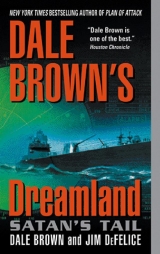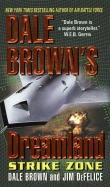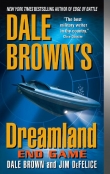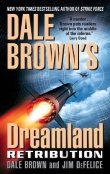
Текст книги "Satan's Tail"
Автор книги: Dale Brown
Жанр:
Боевики
сообщить о нарушении
Текущая страница: 15 (всего у книги 22 страниц)
And sure enough, as the Megafortress circled to the north to get a better look at the British ship that had come through the gulf earlier in the day, the Libyan sub began nudging upward.
“Here we go, Colonel,” said Delaford, monitoring it with the Piranha.
“Good. Zen, you hear that?”
“Flighthawk leader,” said Zen, acknowledging.
Dog was about to hook into the Abner Read when the Dreamland communications channel buzzed with an incoming Eyes Only message. Dog gave his verbal password, then tapped the keypad at the right side of the screen, clearing the transmission in. Major Catsman’s face came on the screen.
“Colonel, the UN has just authorized the pursuit of pirates in territorial waters in the Gulf of Aden.”
Good, thought Dog.
And bad.
“Thank you, Major. I’ll talk to Captain Gale.”
270
DALE BROWN’S DREAMLAND
Aboard the Abner Read,
Gulf of Aden
1905
“GO AHEAD,” THE DREAMLAND TECHIE TOLD STORM. “IT’S A channel on your com system. You’re always connected now.”
Storm looked down and pressed the button on the box on his belt. “Captain Gale.”
“The UN is approving the resolution allowing us to attack in territorial waters,” Dog told him. “We should get the official word in a few hours. I thought you’d like a heads-up.”
A peace offering? Between that and sending the world’s most beautiful woman to his ship, Bastian might yet prove human.
“Good. We’ll move in and get this bastard,” said Storm.
“No. Too soon.”
“Why do you have to disagree with everything I say, Bastian?”
“I don’t disagree with everything you say. Just things that need to be disagreed with.”
“Explain yourself,” said Storm tightly.
“If we attack now, we just get the submarine, and the patrol boat,” continued Dog. “You want their base. Nothing’s changed—except that in a few hours we’ll be able to do something about them, once and for all.”
“We have some places we think are likely candidates,”
said Storm. “We can hit them one by one, after we take out the sub.”
“Or we can follow it to the candidate,” said Dog. “And, as an extra bonus, if we wait, we can do it right. By tomorrow night we can have two Megafortresses, each with two Flighthawks. And more important, rested crews. We can bring my Whiplash people up during the day, and they can spearhead the land attack, along with your shipboard tactical teams.”
“The SITT people are good to go now,” said Storm, using the abbreviation for the specially trained teams of sailors SATAN’S TAIL
271
who specialized in boarding ships and dealing with difficult situations on land. The letters stood for Shipboard Integrated Tactical Team. “But I don’t have enough of them. I’m bringing in Marines.”
“All the better.”
Storm looked down at the deck. Once again Bastian was right. Attacking now might be bold, but it was also likely to be rash. Wait twenty-four hours, and they’d have more firepower. More important, they’d have a coherent plan, rather than reacting ad hoc.
Of course. That was the decision he would have made himself once he’d thought it out. He was resisting only because it was Bastian who’d suggested it.
“Be ready to act if something changes,” Storm told him.
“I always am.”
JENNIFER WATCHED STORM AS HE ENDED THE CONVERSATION
with Dog. His whole manner had changed as soon as he started talking with the colonel. She had seen the type before: fine, even supportive, when dealing with subordinates who didn’t threaten them by questioning their decisions; but come on too strong, and they reacted like an elephant protecting its place in the herd.
She picked up a headset and plugged into the circuit.
“Dog?”
“Hey, Jen.”
“We’re set to try connecting into the Megafortress’s radar system. But I’m worried that we’ll throw you off if something goes wrong here.”
“So what do we do?”
“It might be best to run it when Wisconsin is coming off patrol. We can isolate it to that system, then bring it up.
Worst case then, we just blind one aircraft.”
“Means you’re going to have to wait another four or five hours there.”
“There’s plenty to do. I still have the Werewolves to get ready. I’m training a new pilot.”
272
DALE BROWN’S DREAMLAND
“You are?”
“Storm wants one of his crew handling them.”
“I warned you. How’s Danny?”
“He’s fine. The Marines that have been chopped to Xray Pop are the same ones who were at Khamis Mushait, so he’s having a good time.”
“Oh?”
If she didn’t know Danny was married, she would say he had a serious crush on Lieutenant Klacker, aka Dancer. But this wasn’t the place for gossip.
“All right,” said Dog when she didn’t answer. “We’ll contact you when we’re ready. Take care.”
“Love you.”
As always, he hesitated before responding. “Me too.”
New York
1100
UNDER ANY OTHER CIRCUMSTANCES THE UN SESSION WOULD
have been a highlight of Jed’s life. It certainly was a success: The council voted to authorize the use of force against “international outlaw pirates” in the Gulf of Aden, “wherever they may be found.” A coalition team was authorized to stop the pirates before more civilians were harmed.
“Coalition” was a face-saving way for the others to admit that the U.S. was going to bail them out again.
But Jed didn’t feel all that triumphant as the American delegation left the chamber and headed for the press conference. In fact, he felt exactly the opposite. As Ford and the others moved quickly down the hall, he found himself alone with Secretary of State Hartman.
“The picture,” Jed told him.
“Which one?” asked Hartman. He nodded at someone ahead, and Jed said nothing until they were alone again.
“The one on the cover of the Sunday News. ”
“I’m not sure I saw it.”
SATAN’S TAIL
273
“This one,” said Jed, pulling out the newspaper.
The Secretary of State stopped. “That wasn’t in the presentation.”
“It was just—as I put it together, I made it.”
“Ah, don’t worry about forgetting it. The presentation was fine without it. You can’t do any better than we did today, Jed. Don’t worry. We got the vote. We got it. This is the way things should go—persuasion and consensus. I know you’re more a force guy, but this is the future. Coalitions. You’ll look back on this and be proud.”
“No, I mean the photo shouldn’t been part of the presentation. Or printed.”
“Was it classified, Jed?” Once sleek, Hartman’s face was now a series of puffy lines drawn close together.
“No. I put it together from two different pictures. It’s not a real picture.”
“What? You put it together?”
Two delegates were walking down the hall. The Secretary nodded at them, then gestured for Jed to step to the side with him. Jed felt as if he were shrinking as the others passed through the hall.
“What happened?” asked Hartman. The lines had formed massive blots at the sides of his face.
“I was just fooling around. I don’t know how it could have gotten on the disk I gave Jake. I must’ve left it in the folder of the jpgs that were part of the presentation. When I dumped the folder onto the disk, it must’ve come with the others. It was just a number; I didn’t have a thumbnail or anything.”
“You have the original?”
“There is no original. I just fiddled with the shot of the tanker.”
“Fiddled? Give me your laptop.”
“I can’t.”
“What do you mean you can’t?”
“It’s against security procedures. I—”
“Jed.” The Secretary held out his hand.
274
DALE BROWN’S DREAMLAND
“OK,” said Jed. “Yeah. You’re a cabinet officer. Right.” He handed it over.
“You should say nothing about this until I tell you what to say. Go back to D.C. Talk to no one. Go. Now.”
“Yes, sir.”
SINCE IT WAS SUNDAY, THE TRAFFIC TO LAGUARDIA AIRPORT
was relatively light. The car whisked over the Triburough Bridge, bounding over the metal work plates so roughly that Jed was jostled against the door. As they passed from the bridge to the Grand Central Parkway, he glanced at the elevated tracks above the road; a set of red subway cars were just arriving. He felt envious of the people who’d be getting aboard—whatever their day held, it was bound to be better than his.
Not that he had set out to deceive anyone. On the contrary.
But obviously, inadvertently, he had. And in a big way—a big, potentially embarrassing and scandalous way.
Jed saw the picture on the front page of the newspaper at a stand as he walked inside the airport. At first he quickened his pace; then he went back and bought a copy. He bought the Daily News and another local paper as well, Long Island Newsday.
He found a spot in the terminal to sit and read through the story in both papers. Newsday, a more sedate tabloid than the Daily News, didn’t have a picture at all. The News story was more sensational, but if it weren’t for the photo, it would have been accurate.
A big if, admittedly.
The caption to the picture said merely that the attack was the work of pirates in the Gulf of Aden. The ship was not identified, nor was the attack dated.
Well, there had been attacks on ships, and at least two had been sunk that Jed knew of. Another had exploded and killed men aboard the Abner Read. So it wasn’t that wrong.
Except for the fact that it was completely made up.
Jed looked at the picture. Between his fiddling and the SATAN’S TAIL
275
newspaper’s reproduction, it was barely possible to tell that it was a ship. There was no way of getting any identifiable details from it, no name or even enough of a silhouette to ID
it with.
“Pretty wild, huh? Pirates on the high seas in 1997?”
Jed looked up. A man had sat down next to him and was pointing at the newspaper. He appeared to be in his forties.
“Yeah,” said Jed.
“You think that really goes on?”
“They wouldn’t make it up, would they?”
“The government does that all the time. But I guess they couldn’t make up pictures, right?”
“No,” said Jed, his voice hoarse. “No, they couldn’t.”
Gulf of Aden
2200
FATIGUE HOUNDED ALI’S EVERY STEP AS HE CLIMBED DOWN
the ladder of the submarine. He’d had terrible dreams when he tried to sleep, dreams that kept him awake: Abu Qaed as a babe sucking at his mother’s breast; Abu Qaed following him down a street as a young man in Cairo; Abu Qaed with him in Mecca.
The dreams all ended the same way—his son faded into a milky oblivion, and Ali lay wide awake for the rest of the night, sweating profusely.
To sleep once and for all, to lie in oblivion—that would be his paradise. To join his son, his cousin Mabrukah, countless others—that would be reward beyond all measure.
“Captain!” shouted the Libyan commander who had brought the submarine to the base. He told Ali in Arabic that he was honored to be a soldier of God.
“As are we all,” said Ali.
The commander began showing Ali around the submarine, a Project 641 ship known as a “Foxtrot” in the NATO reporting system. The craft’s basic design was dated; the type had 276
DALE BROWN’S DREAMLAND
first joined the Russian fleet at the very end of the 1950s, though this particular submarine had slipped into the ocean in 1966. Just a few inches shy of three hundred feet, the sub displaced 2,475 tons once submerged; she could dive to at least 985 feet and make about fifteen knots while submerged. She could run submerged for as many as five days, though her range was extremely limited beneath the water—at two knots, she could go perhaps three hundred miles before her batteries gave out completely. Her range on the surface, however, was an impressive twenty thousand miles, a good distance for a diesel-powered submarine. The craft also had snorkeling gear, which allowed it to run its engines while submerged; the captain referred to it as a “low observable” mode.
The captain showed Ali to the sonar room, boasting that the submarine had been updated with a full range of Russian equipment, including gear found in much newer boats. The batteries were the same as those used in the improved version of the class, the Project 641B, and a variety of tech-niques were employed to decrease its sound, from an improved propeller system to the sound-deadening material that covered nearly every visible surface.
Ali paused at the steering station of the submarine. To the uninitiated, which included him, the control area was a jumble of boxes and controls, wheels, levers, and dials seemingly arranged in an incoherent jumble. But that was nothing compared to the jungle of wheels nearby that controlled the valves for the high pressure air and trim manifolds. These controls were necessary for stabilizing the submarine, allowing it to dive or surface. The blue and red valve handles looked like intertwined spider nests.
“The small size of our crew gave us some difficulty on the voyage,” said the captain. “If we could have two dozen more men to train—”
“How many men do you have?”
“We made the sail with thirty-eight. It was very difficult at times. Ordinarily, seventy-eight men take the craft into battle. We can do with a few less, but—”
SATAN’S TAIL
277
“If you made it all that way with only thirty-eight men, you will be able to do the same here. Besides, there is no time to train them. By this time tomorrow you will be under way. The cruise will not require a relief crew, I assure you.”
“We would value action,” said the captain finally.
“You will have plenty. An aircraft carrier is making its way down from the Suez Canal. It will be in the Gulf of Aden at dawn the day after tomorrow.”
They moved to the chart table, where the Libyan captain brought out a chart of the gulf area. The maps were not very good—surely another sign that Allah had guided the man here.
“I will get you another set before we sail,” Ali assured him. “But for now, these will do—we will sail to the eastern end of the gulf as swiftly as possible. It is several hundred miles.” He pointed to ’Abd al K¯ur¯ı, a small island roughly seventy miles east of the tip of Somalia. Allah had given him a plan overnight—in compensation for the dreams, perhaps.
They would strike where the carrier least expected it: at the end of the passage through the gulf. The other ships would lure the carrier to an attack, allowing the submarine to close in with its torpedoes. Sharia would launch its missiles at the same time—the Ark Royal would be overwhelmed.
“I have spies all along both coasts, and among the traffic in the gulf,” Ali told the submarine captain. “They will give us his location without trouble. We will then make an attack.”
He described the three-tiered attack he had mapped out in general terms, giving the submarine commander enough information so he would know his duty, but not enough to scuttle the missions of the other ships if he was captured. The Sharia, fueled and disguised as a benign pile of junk ready for the salvagers’ blowtorches, would put out to sea at dusk on its slow trek eastward. The rest of the fleet would slip out a few hours afterward. The entire flotilla would be gone within thirty-six hours.
“It is mostly a matter of timing,” added Ali. “Once things begin, it follows the clock. There will be no need for com-
278
DALE BROWN’S DREAMLAND
munications. And no possibility of it. But we will succeed.”
“God willing,” said the captain.
“I have no doubt that he is willing.”
“Nor do I.” The captain looked at the chart. “We will be sailing more than five hundred miles.”
“It will be somewhat more,” said Ali.
“We will have to go on the surface during the night to accomplish this. It is a risk we must take now,” said the captain.
Ali folded his arms, studying the captain’s face. His assessments were correct, and he seemed aggressive. His passage here, however, had demonstrated caution in the extreme.
Which was the true man?
The answer could be seen in the gaze at a chart or the knitting of a brow. Ali would have to trust that the man who spoke of God’s will was the truer—or that God would take a hand when necessary.
“There is an American force in the waters. They are a serious concern, far more than the British,” said Ali. He showed the submarine captain where Satan’s Tail normally patrolled. “He cannot go into the coastal waters,” said Ali.
“As long as you stay close to the coast, he cannot attack you.
He may follow, though. We will use that to our advantage if it happens.”
Ali outlined his plan. Tomorrow afternoon a pair of patrol boats would head a few miles to the west and then cut directly north across the gulf toward Yemen. The submarine would sail at dusk, followed by two other patrol boats that would shadow him. A few hours later a second group of patrol boats would go across the gulf, with the Sharia following roughly the same route the submarine did. Ali would follow in the large amphibian ship’s path.
Most likely the Americans would attack the first group of patrol boats as they headed toward Yemen or soon afterward.
If this happened, the submarine would have clear sailing.
The next possibility was that those boats and the submarine would be missed; the second wave of patrol craft would SATAN’S TAIL
279
draw the Americans’ attention. The third possibility was that the Americans would detect the submarine and follow it.
“Their sensors are not very good in the shallow water,”
boasted the submarine captain. “I have sailed right past American ships in the Mediterranean many times.”
“This is not the Mediterranean, and you have not dealt with this ship and its commander before,” said Ali. “Do not be overconfident. Satan’s Tail is a ship like no other you have ever seen. The other day one of my vessels fired eight Exocet missiles at it, and it survived.”
“We will do better if we come up against it.”
“No. You must stay near the coast. Keep in the shadow of the Karkaar Mountains. Do not give them a reason to come for you.”
“If they attack me?”
“If they attack you and you have no other choice, then you may engage. But your first mission is to get away.” Ali looked down at the chart. “I will get them if they interfere. I will find a way.”
“Let me show you the rest of the boat,” said the Libyan.
They went through the forward spaces. Some of the equipment had been updated; even the older gear was clean and freshly painted, a sign of discipline that pleased Ali, for to him it meant not simply that the captain paid attention to details, but that the crew paid attention to the captain. This was another of the lessons he saw from the Italians, in going from ship to ship in their fleet—one could measure the crew by the captain, and vice versa.
The tour continued to the forward torpedo room, where the large tube openings protruded from the wall like the stubby teats of a goat. There were six firing tubes, three to a side.
“Only six torpedoes?” asked Ali.
“I was told you would supply more,” said the captain.
“I do not have Russian torpedoes. Nor anything large enough for these tubes.”
The submarine used a standard Russian design, twenty-
280
DALE BROWN’S DREAMLAND
one inches, or 533mm, in diameter. The torpedoes that Ali had were Italian A244s—a very versatile weapon, as its adaptation to his boats and tactics had shown, but at 12.75
inches, a much smaller and lighter torpedo.
“Perhaps we can modify the tubes,” suggested the captain.
“The Russians have done so.”
He is optimistic by nature, thought Ali. That would be useful in battle.
“There isn’t time for that,” said Ali. “Six will have to suffice.”
Alexandria,
near Washington, D.C.
1500
JED TOOK THE METRO FROM THE AIRPORT AND WALKED THE
five blocks from the Metro, stopping first to grab the Washington Post—no picture on the front or inside the newspaper, where the story played at the top of the international section.
Standing at the register waiting to pay, he glanced sideways toward the coolers at the six-packs of beer.
“Maybe later,” he said out loud. He wasn’t much of a drinker.
“Later?” asked the clerk.
“Just the paper,” said Jed. He took his change and walked the five blocks home. His mood swung from anger at himself to depressed disbelief.
How could he have been so stupid?
Why the hell had he made the picture in the first place?
He was an assistant to the National Security Advisor of the United States, not a member of the Harvard Lampoon.
Damn, I’m a jerk, he told himself. I deserve to get booted across the Potomac.
And I will be. Probably by the President himself.
The answering machine was blinking at him when he got in: twelve calls.
SATAN’S TAIL
281
That wasn’t a record, but it was close for a Sunday. He hadn’t turned on his phones since he’d left the UN; he did now, and saw that each had nearly as many calls.
Jed put them down on his bed and stood over them.
I’m either going to deal with this, he thought, or I’m not.
I am going to deal with this.
His house phone rang and he jumped, but made no effort to get it.
Man, what are my parents going to say? And Colonel Bastian? And Zen? What is my cousin Zen going to say?
He’s going to say I’m a jackass.
Whoever called hung up without leaving a message.
Zen would sit there in his wheelchair, shake his head.
Then he’d mutter something like, “Little Jed, Little Jed, Little Jed.”
Then he took me out to shoot some hoops …
It really had happened that way, when Jed got in trouble as a senior in high school, caught smoking a marijuana cigarette in the school bathroom—only his second time ever smoking dope, and of course he got caught. He’d thought that was the end of the world.
It was, then. Zen’s appearance in his uniform, fresh from the Gulf War—God, he was a sight, standing in the door.
Standing …
What would Zen say now?
He’d say get off your ass and deal with it. If I can deal with being in the f-in’ wheelchair, you can deal with this, asshole.
Jed picked up the sat phone and started checking his messages.
Aboard the Wisconsin , Gulf of Aden
2400
“THERE’S A MOORING AREA FOR ABANDONED SHIPS AT THE
western end of the little inlet there,” said Dog, talking to the 282
DALE BROWN’S DREAMLAND
crew of Megafortress Delta One as he prepared to hand off the patrol to the other crew. “The submarine is across the arm of the bay, in this area here. It looks like a manmade cave, with just enough clearance for a small vessel to get in.
According to what we’ve been able to dig up at Dreamland, the Italians found it in 1940 or 1941 and began modifying it for use as a submarine pen. Eventually it was abandoned.
The submarine is there along with two patrol boats. Piranha is right here, about a hundred feet from the mouth of the cave. At least one patrol boat is sitting with these civilian boats in this area, and one of the moored ships isn’t a wreck.
We’ll have fresh satellite intelligence in a few hours, but from old snaps, we think the headquarters area is over here, below the cliffs.”
Dog added that there was a legitimate port nearer to Karin, a few miles away; at least one patrol craft was hiding there as well.
“More than likely there are ships and patrol craft hidden in different spots all along the coast,” he added. “But I don’t want to send a Flighthawk over, on the chance it’ll tip them off. We’ll wait until we’re ready to deal with whatever is going on. Your job tonight is to stay far enough away that they can’t see you, but close enough so you can react if something happens. No overflights, no combat if at all possible.”
Dog continued, passing along the frequencies that were being used by the Abner Read and the other ships, emergency landing fields, and the other necessary minutiae of a successful mission.
ZEN SWEPT THE FLIGHTHAWK TOWARD THE COAST AS DOG
finished up his brief with the crew of the Delta One. The Flighthawk pilot aboard Delta One, Captain Eric “Guitarman” Mulvus, had seen action as an Army helicopter pilot in Panama and the Gulf War, left the regular Army, somehow managed to get into the Air Force Reserve, hopscotched into an ROTC program, and emerged as an F-16 pilot. Clearly a SATAN’S TAIL
283
finagler, Guitarman’s real claim to fame was lead guitarist in a pickup band known as the Dream Makers. He was a decent Flighthawk pilot, though this was his first mission in a combat zone.
Zen slid down to fifteen hundred feet, gliding along the coastline. While they were giving the submarine base a wide swath and avoiding any chance of tipping the pirates off, Dog had decided there was nothing wrong with surveying the coastline well to the east as they went off duty. Starting about fifty miles from the cave where the sub was hidden, the Flighthawk would survey the coastline to the Indian Ocean with its infrared video camera. Even if they didn’t spot anything, the survey would form a baseline for future operations; the computer would review the recorded images and flag what had changed.
Zen settled onto a path about a quarter of a mile north of the coast. During the sixteenth century, Somalia was a flash-point for Christian and Islamic cultures. Islam dominated the cities and areas on the coast where Zen flew, and Christians dominated the interior. The severe terrain kept relations between the two religions manageable, isolating the communities and weakening the appetite for conquest. Still, there had been many fights over the centuries; domination by one group or the other had not halted the flow of blood, nor, to be fair, did the sharing of a common religion prevent murder or depredation.
Somalia had been divided in two during the nineteenth century, with the British dominating the northern coast and Italy the eastern, including the tip of the Horn of Africa. In the early days of World War II, Italy had seized British Somaliland; in 1941 the British took it and the rest back. The country’s history after the war was partly cruel and partly confused, with the UN Security Council placing Italy in charge of the southern portion and Britain retaining the north, against the wishes of both the people and the UN. Unification, revolution, alliance with the Russian communists, chaos, hunger, and disaster had been the lot of the people ever since. The UN’s effort 284
DALE BROWN’S DREAMLAND
to fight starvation in the early 1990s had ended in disaster for the U.S. when an Army unit tried to arrest followers of a warlord; the bungled politics surrounding the affair was one of many issues that had helped President Martindale win election. But the incident also convinced the UN to pull out, making ordinary Somalians victims once more.
That’s always the way it is, thought Zen. The little guy takes it in the ear.
His father used to say that all the time. That’s why you don’t want to be a little guy.
Zen hoped that wasn’t the real lesson to be drawn, though sometimes it was hard to argue against.
The Flighthawk chugged along, not caring a whit for history or injustice. A large vessel sat in the water off the left wing. The infrared image seemed a little off as Zen passed.
It took him a moment to realize that the ship’s image had been fairly uniform; there were no hot spots, which you’d expect if the engines were running.
“Wisconsin, this is Flighthawk leader,” said Zen. “Looks like I found that converted oiler we saw the other night. It’s dead in the water. I’m going to take a close-up look at it.”
“Roger that, Flighthawk leader. Something up?”
“Not sure.”
The ship seemed dead cold, the only heat the lingering warmth of the sun. And it was high in the water.
“Maybe we didn’t save it after all,” said Zen after a second pass. “Maybe they had already taken it, got the fuel off, then brought it here. I think we ought to have somebody check it out.”
“Agreed,” said Dog. “I’ll dial it into Storm. Stand by.”
Aboard the Abner Read
2400
DANNY STARED AT THE HOLOGRAM, WHICH SHOWED THE LIKELY
location of the pirate camp near a village on the coast and SATAN’S TAIL
285
just below a sharp cliff. A sequence of satellite photos had been used to form the basic layout, focusing on three old buildings across from a mooring where there had been occasional activity over the past several weeks. The old ships in the harbor gave the pirates good hiding places and made it difficult to flush them out if they managed to take positions there. While none were visible from the photos, the Abner Read would begin the engagement by pummeling the old hulks and neutralizing the possibility. The ship would wait for the submarine to come out of the cave; the shallow water as well as a breakwater and two old wrecks near the entrance prevented an easy torpedo shot.
The ground team would prevent escape by land and secure whatever the pirates had onshore. The old village had been largely abandoned and could be isolated by capturing a small bridge at the southern end accessible from the water; with that out of the way, the main force could concentrate on the buildings directly across from the mooring. The Marines and Danny Freah’s Whiplash team would land at the top of the cliff and rappel down from two different points to press home the attack. The troops could be deposited as the Werewolves blazed in from the oceanside. Between the high-pitched whine of the robot helos’ rotors and the Abner Read’s exploding shells, the Osprey’s approach would be difficult to hear.
“They most likely have at least a token watch in this area up here,” said Danny, pointing to a ridge just behind the point of the cliff. “We have to find out before we attack. We can send a Flighthawk over shortly before the attack and look at the infrared camera. That’ll show us where everything is. We can have it orbit during the operation, showing us what’s going on.”
“We need at least a token force to come in off the shore to the west,” said Dancer. “Otherwise they can just filter down here and get away. And just for good measure, we should put people on this side of the village to the east as well. We’re looking at three heavily armed teams, lots of firepower, sup-
286
DALE BROWN’S DREAMLAND
port from those robot helos. If there are two hundred pirates in there—”
“I doubt there are two hundred,” said Danny. “Not even a hundred.”
“We still need more people,” said the Marine lieutenant.
Danny found himself admiring her professional skepticism.
Too often junior officers simply parroted what their superiors drew up.
And she was good-looking when she was skeptical.
“We can always use more people,” said Danny. “But the technology will let us leverage what we have.”
“I’ll take two boots on the ground over a silicon chip any day,” said Dancer.








